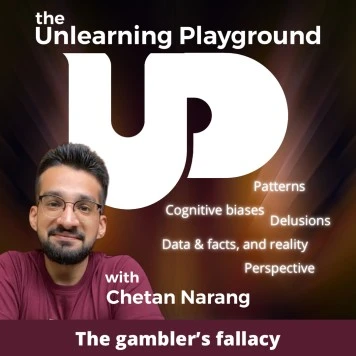Facts are not everything. At least half of the game is knowing how to handle the facts.
Fyodor dostoevsky (crime & punishment)
The gambler’s fallacy is one of those logical fallacies of the human psyche that is equal parts hilarious and equal parts serious.
As you’ll see in this episode, the examples I provide while talking about it are almost laughable and ridiculous at times. But the impact it has on our everyday lives is uncanny. And that makes this a very important episode in the series of my episodes on human cognitive biases and logical fallacies.
For the entire series, please hop on to the playlist here.
It is a short and sweet episode, like most others in my podcast. 😛
Hope you experience as much resonance listening to it as much I did while creating it.
So, without further ado, let’s get into it.
I’ll see you in the playground.
Until next time.
Peace out.

Check it out on your platform of choice.
Or listen on the custom player below
The human psyche is full of cognitive biases and logical fallacies. Do not, for a second, let someone convince you that that is not true for you. It’s true that spotting an error in somebody else’s judgments and/or decisions is much easier than doing the same for your own self. But that should not lead you to thinking that you are somehow free of making the same lapse in judgment someday.
The gambler’s fallacy is one such logical fallacy of our minds that is quite easy to spot in someone else’s position, especially if you yourself are not too attached to that position yourself.
However, as is the case with most potent truths, the real nectar of understanding it is in discovering it in one’s own thinking and day-to-day rigamarole.
My aim with this podcast episode (which is only 10 minutes long btw) is to explain, in very easy-to-understand language, what this fallacy stands for, what are the ways in which you can identify it in your own thinking and how you can try to overcome it in your everyday interactions.
Below are a set of frequently asked questions about this topic. I have tried to answer them out in an easy manner, but for a detailed understanding, I would highly recommend going through the episode itself. Like I mentioned above, it will be 10 minutes worth spending on the internet.
What is the gambler’s fallacy?
The tendency of a person to consider that future outcomes of a random event are dependent on the outcomes seen for the same/similar events in the past.
What is an example of the gambler’s fallacy?
If ten consecutive coin tosses result in HEADS, it is a very human thing, and also a biased thing, to consider that the chance of the next toss resulting in a TAILS is higher. This is a simple and the most common example of the gambler’s fallacy.
How do you fight the gambler’s fallacy?
Becoming more self aware, and opening yourself up for honest and engaging conversations with people who can correct you, is one way to position yourself such that you do not fall prey to the gambler’s fallacy, especially where it matters. This is actually applicable on all human cognitive biases and logical fallacies.
In addition to this episode, for the curious listener, I would also advise a playlist of similar episodes that I run on my podcast. It is a series where each individual episode is dedicated to a particular cognitive bias and/or a logical fallacy, and I try to walk you through it in an easy-to-digest sort of a manner. That is quite the generic theme of The Unlearning Playground podcast as well as much of all of my work really.




